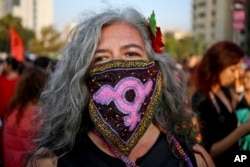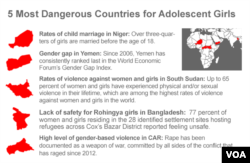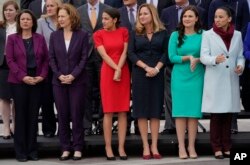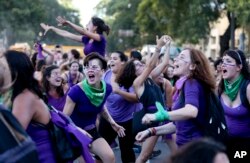Civic and governmental organizations around the world are preparing to recognize and celebrate International Women's Day on Friday.
International Women's Day is a more than 100-year-old celebration of women's social, economic, cultural and political successes worldwide while also calling for gender equality.
It falls on the same day every year, March 8, and brings together governments, women's organizations, businesses and charities. Cities and towns around the world mark the day with rallies, conferences, art and cultural projects, and lectures.
It began in 1908 when 15,000 women garment workers went on strike and marched through the streets of New York, demanding shorter work hours, better pay and voting rights. In 1910, a German woman named Clara Zetkin suggested the declaration of a Women's Day at an international conference attended by 100 women. The idea was accepted unanimously.
In 1911, it was celebrated for the first time in Austria, Denmark, Germany and Switzerland. More than 1 million women and men attended demonstrations in support of a woman's right to work, vote, study and hold public office.
The United Nations officially recognized International Women's Day for the first time in 1975. In 2011, then-U.S. President Barack Obama took Women's Day a step further, declaring March Women's History Month.
Since the day is not country-, group- or organization-specific, the focus for each year's celebration varies widely, but all are centered around the myriad issues faced by women around the world.
Violence, other dangers
Ahead of the International Women's Day, the International Rescue Committee has released a report on the five most dangerous places in the world to be an adolescent girl. Taking into consideration data on child marriage, adolescent birth rates, literacy, rates of violence and child labor, the IRC named Niger, Yemen, Bangladesh, South Sudan and the Central African Republic as the most dangerous for young girls.
Bangladesh, South Sudan and the Central African Republic led the group in gender-based violence. The IRC noted that 65 percent of women and girls in South Sudan have experienced physical and/or sexual violence in their lifetime, making it one of the highest rates in the world.
In Nigeria, the threat to girls comes in the form of child marriages. The IRC estimates 75 percent of Nigerian girls under the age of 18 are married.
Wars and ethnic conflicts around the world are being recognized this year as the main cause of sexual and gender-based violence. The United Nations and the Red Cross and Red Crescent last month joined forces to end the use of rape as a weapon of war.
"Let me be clear. Sexual and gender-based violence in conflict is not only a horrendous and life-changing crime, most often perpetrated against women and girls. It is also used as a tactic of war, to terrorize families, dehumanize communities and destabilize societies, so that they struggle to recover for years or even decades after the guns fall silent," U.N. Secretary-General Antonio Guterres said.
Other world leaders have also decided to take on gender-based violence.
Sierra Leone President Julius Maada Bio recently declared rape a national emergency and warned that anyone caught having sexual relations with a minor could face up to life in prison.
"Each month, hundreds of cases of rape and sexual assaults are being reported in this country. These despicable crimes of sexual violence are being committed against our women, children and even babies," he said.
Activism in politics, society
Last year's midterm elections in the United States saw a record 117 women elected to Congress. Unfortunately, such strides are a lot harder in other countries.
In Haiti, where the constitution stipulates that 30 percent of lawmakers be women, that is far from a reality.
"The fight we are waging in the parliament aims to raise the awareness of my fellow colleagues so that they also fight for this equality. We are only four women [lawmakers], but we represent a country full of women," Haiti's only woman senator, Dieudonne Luma Etienne, told VOA.
In Saudi Arabia, where women only last year won the right to drive, the government has been accused of using its counterterrorism laws to silence activists, including women.
A panel of U.N. rights experts on Monday called on the kingdom to release defenders who they said were unjustly held, including rights lawyer Walid Abu al-Kahir, poet Ashraf Fayadh and women activists Loujain al-Hathloul and Israa al-Ghomgham.
Zaynab al-Khawaja of the Gulf Center for Human Rights told the panel: "We highlight some of the torture methods that are being used in Saudi Arabia — electrocution, flogging, sometimes whipping — on the thighs, for example — sexual assault, where some women human rights defenders have been stripped, have been groped, have been photographed naked, some while handcuffed, and others while blindfolded."
International recognition
On International Women's Day in 2007, then-U.S. Secretary of State Condeleeza Rice established the International Women of Courage Award to be presented to women who have shown leadership, courage and resourcefulness. U.S. embassies around the world can recommend a woman as a candidate.
First lady Melania Trump and Secretary of State Mike Pompeo honored 10 women Thursday. The honorees were Razia Sultana from Bangladesh; Moumina Houssein Darar of Djibouti; Mama Maggie of Egypt; Sister Orla Treacy of Ireland; Col. Khalida Khalaf Hanna al-Twal of Jordan; Olivera Lakico of Montenegro; Naw K'nyaw Paw of Myanmar; Flor de Maria Vega Zapata of Peru; Marini de Livera of Sri Lanka; and Anna Aloys Henga of Tanzania.
The winners included human rights activists, police officers, lawyers, a nun and an investigative journalist.
The U.S. State Department has so far recognized more than 120 women from more than 65 countries for advocating for human rights, women's rights, peace and government transparency.
Women's rights through arts
International Women's Day celebrations also include a lighter, brighter side of women's lives. Several international groups have chosen to shine a light on women they consider heroes.
The U.N.'s theme this year is, "Think equal, build smart, innovate for change," highlighting ways to promote gender equality and the empowerment of women.
On its website, the U.N. has collected stories of women who have made a difference in their communities. Stories such as that of Nur Nahar, a refugee from Myanmar who has taken it upon herself to mentor other women fleeing to refugee camps in Bangladesh, and Colombian Mila Rodriguez, who founded an all-women group to promote peace and Afro-Colombian music.
The humanitarian nonprofit Care turned to celebrities for a campaign that poses the question, "Who puts the #HerInHERO for you?" Ahead of International Women's Day, Care released a video with prominent women answering that question with empowering words such as "Strong," "Bold," "Passionate" and "Courageous" emblazoned on the screen.
A female hero is also arriving at American theaters on International Women's Day as Disney subsidiary Marvel Studio releases Captain Marvel, its first female-led superhero film.
VOA's Lisa Schlein, Mariama Diallo and Jacquelin Belizaire contributed to this report.












